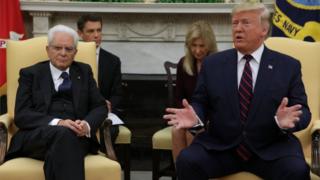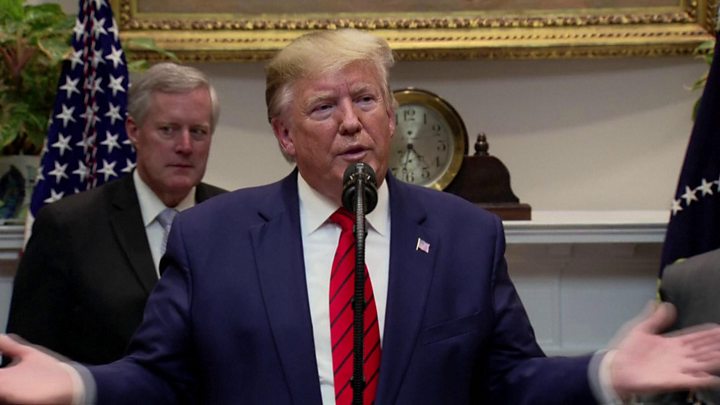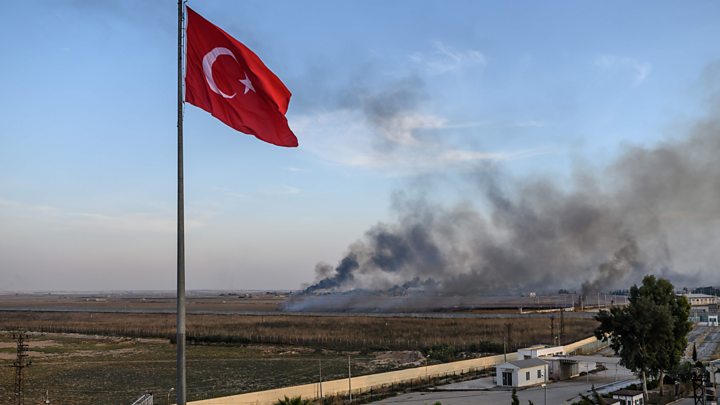Home » Middle East »
Turkey-Syria offensive ‘not our problem’ – Trump
President Donald Trump has said it is “not our problem” if Turkey enters Syria, adding that the Kurds are “no angels, by the way”.
His comments come as the US faces intense criticism for withdrawing its forces from Syria, which some say gave Turkey the green light to launch a cross-border offensive.
Mr Trump told reporters at the White House the US is “not a policing agent”.
“It is time for us to go home,” he said.
Turkey launched the offensive in northern Syria a week ago to push back from its border members of a Syrian Kurdish militia called the People’s Protection Units (YPG) and create a 32km (20-mile) deep “safe zone” along the Syrian side of the border, where up to two million Syrian refugees can be resettled.
The Turkish operation came after Mr Trump ordered the withdrawal of US forces from the area.
What did the president say?
Mr Trump made the comments during a meeting with Italian President Sergio Mattarella at the White House.
The president said he saw the situation on the Turkey-Syria border as “strategically brilliant” for the US.
“Our soldiers are out of there. Our soldiers are totally safe. They’ve got to work it out. Maybe they can do it without fighting,” he said.
“We’re watching and we’re negotiating and we’re trying to get Turkey to do the right thing, because we’d like to stop wars regardless.”
The president also said that the Kurds are “not angels”.
“They fought with us. We made a lot of money for them to fight with us, and that’s okay,” he said. “They did well when they fought with us. They didn’t do so well when they didn’t fight with us.”
Mr Trump did not elaborate on his comments about the Kurds, who only days ago he called “wonderful people”.
At the same press conference, Italy’s President Mattarella, said that Italy condemns the Turkish offensive.
What’s the context?
Ankara insists the YPG militia is an extension of the Kurdistan Workers’ Party (PKK), which has fought for Kurdish autonomy in Turkey since 1984 and is designated as a terrorist group by the US and EU.
The US has designated the PKK, which has fought for Kurdish autonomy in Turkey for three decades, as a foreign terrorist organisation and Specially Designated Global Terrorist Entity. The US has acknowledged links between the PKK and YPG, but it has rejected Turkey’s assertion that the YPG is an extension of the PKK.
The YPG dominates an alliance of Kurdish and Arab militias called the Syrian Democratic Forces (SDF), which has driven the Islamic State (IS) group out of a quarter of Syria over the past four years with the help of air strikes by a US-led multinational coalition.
On Sunday, after US troops began withdrawing from the region and Turkish-led forces made gains, the Kurds agreed a deal with the Syrian government for the Syrian army to be deployed on the border to help repel the Turkish assault.
Vice President Mike Pence and US Secretary of State Mike Pompeo are heading to Turkish capital, Ankara, amid the incursion into northern Syria. Turkey’s President Recep Tayyip Erdogan has said he will meet Mr Pence after appearing earlier to have ruled it out.
President Trump, meanwhile, will meet with congressional leaders later on Wednesday to discuss the situation.
The US announced sanctions against Turkey on Monday.
On Wednesday, a spokesman for Turkey’s President Erdogan said the country’s foreign ministry was preparing retaliatory sanctions against the US.
Ankara has vowed to continue its offensive, and has refused to negotiate with Kurdish fighters.
What’s the latest on the ground?
The UK-based Syrian Observatory for Human Rights said on Wednesday that Syrian and Russian forces had entered the border town of Kobane, following a deal struck between the Kurds and Damascus in the wake of Turkey’s incursion.
Dozens of civilians have reportedly been killed in the operation so far and at least 160,000 have fled the area, according to the UN.
The medical charity Médecins Sans Frontières (MSF) said it had “taken the difficult decision to suspend the majority of its activities and evacuate all its international staff from north-east Syria”.
The UN Security Council meanwhile on Wednesday once more called on Turkey to stop its assault.
Syrian government forces had also entered the strategic town of Manbij on Tuesday – inside the area where Turkey wants to create its “safe zone”.
Turkish troops and pro-Turkish, anti-government fighters have also been gathering near Manbij.
Over the past two years, hundreds of US troops have visibly patrolled the strategic town, but they left earlier this week.
On Tuesday, Russia – a key ally of Syrian President Bashar al-Assad – said its forces were patrolling along the “line of contact” between Syrian and Turkish forces.
For now, Syrian forces have not been deployed between Tal Abyad and Ras al-Ain, where Turkey has focused its efforts.
How did we get here?
Kurdish-led forces have been a key ally of the US in the fight against the IS in Syria.
They described the US withdrawal, which preceded Turkish action, as a “stab in the back”.
There are fears the destabilisation could lead to a resurgence of IS, as thousands of former fighters and their relatives are being detained in northern Syria.
Hundreds of IS family members are said to have escaped from one camp already.
Analysts say that apart from fighting IS, the Kurds were fundamental to the US in limiting the influence of rivals Russia and Iran.
Source: Read Full Article





